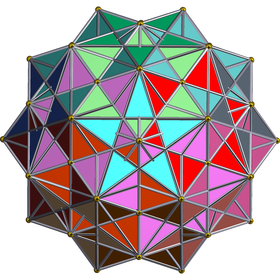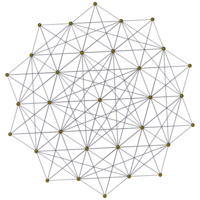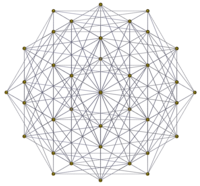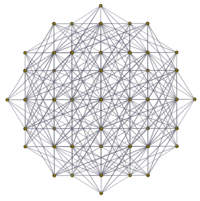Small stellated 120-cell
| Small stellated 120-cell | |
|---|---|
 Orthogonal projection | |
| Type | Schläfli-Hess polytope |
| Cells | 120 {5/2,5} |
| Faces | 720 {5/2} |
| Edges | 1200 |
| Vertices | 120 |
| Vertex figure | {5,3} |
| Schläfli symbol | {5/2,5,3} |
| Coxeter-Dynkin diagram | |
| Symmetry group | H4, [3,3,5] |
| Dual | Icosahedral 120-cell |
| Properties | Regular |
In geometry, the small stellated 120-cell or stellated polydodecahedron is a regular star 4-polytope with Schläfli symbol {5/2,5,3}. It is one of 10 regular Schläfli-Hess polytopes.
Contents
1 Related polytopes
2 See also
3 References
4 External links
Related polytopes
It has the same edge arrangement as the great grand 120-cell, and also shares its 120 vertices with the 600-cell and eight other regular star 4-polytope. It may also be seen as the first stellation of the 120-cell. In this sense it could be seen as analogous to the three-dimensional small stellated dodecahedron, which is the first stellation of the dodecahedron. Indeed, the small stellated 120-cell is dual to the icosahedral 120-cell, which could be taken as a 4D analogue of the great dodecahedron, dual of the small stellated dodecahedron. With its dual, it forms the compound of icosahedral 120-cell and small stellated 120-cell.
The edges of the small stellated 120-cell are τ2 as long as those of the 120-cell core inside the 4-polytope.
| H3 | A2 / B3 / D4 | A3 / B2 |
|---|---|---|
 |  |  |
See also
- List of regular polytopes
Convex regular 4-polytope - Set of convex regular 4-polytope
Kepler-Poinsot solids - regular star polyhedron
Star polygon - regular star polygons
References
Edmund Hess, (1883) Einleitung in die Lehre von der Kugelteilung mit besonderer Berücksichtigung ihrer Anwendung auf die Theorie der Gleichflächigen und der gleicheckigen Polyeder [1].
H. S. M. Coxeter, Regular Polytopes, 3rd. ed., Dover Publications, 1973. .mw-parser-output cite.citation{font-style:inherit}.mw-parser-output .citation q{quotes:"""""""'""'"}.mw-parser-output .citation .cs1-lock-free a{background:url("//upload.wikimedia.org/wikipedia/commons/thumb/6/65/Lock-green.svg/9px-Lock-green.svg.png")no-repeat;background-position:right .1em center}.mw-parser-output .citation .cs1-lock-limited a,.mw-parser-output .citation .cs1-lock-registration a{background:url("//upload.wikimedia.org/wikipedia/commons/thumb/d/d6/Lock-gray-alt-2.svg/9px-Lock-gray-alt-2.svg.png")no-repeat;background-position:right .1em center}.mw-parser-output .citation .cs1-lock-subscription a{background:url("//upload.wikimedia.org/wikipedia/commons/thumb/a/aa/Lock-red-alt-2.svg/9px-Lock-red-alt-2.svg.png")no-repeat;background-position:right .1em center}.mw-parser-output .cs1-subscription,.mw-parser-output .cs1-registration{color:#555}.mw-parser-output .cs1-subscription span,.mw-parser-output .cs1-registration span{border-bottom:1px dotted;cursor:help}.mw-parser-output .cs1-ws-icon a{background:url("//upload.wikimedia.org/wikipedia/commons/thumb/4/4c/Wikisource-logo.svg/12px-Wikisource-logo.svg.png")no-repeat;background-position:right .1em center}.mw-parser-output code.cs1-code{color:inherit;background:inherit;border:inherit;padding:inherit}.mw-parser-output .cs1-hidden-error{display:none;font-size:100%}.mw-parser-output .cs1-visible-error{font-size:100%}.mw-parser-output .cs1-maint{display:none;color:#33aa33;margin-left:0.3em}.mw-parser-output .cs1-subscription,.mw-parser-output .cs1-registration,.mw-parser-output .cs1-format{font-size:95%}.mw-parser-output .cs1-kern-left,.mw-parser-output .cs1-kern-wl-left{padding-left:0.2em}.mw-parser-output .cs1-kern-right,.mw-parser-output .cs1-kern-wl-right{padding-right:0.2em}
ISBN 0-486-61480-8.
John H. Conway, Heidi Burgiel, Chaim Goodman-Strass, The Symmetries of Things 2008,
ISBN 978-1-56881-220-5 (Chapter 26, Regular Star-polytopes, pp. 404–408)
Klitzing, Richard. "4D uniform polytopes (polychora) o3o5o5/2x - sishi".
External links
- Regular polychora
- Discussion on names
- Reguläre Polytope
- The Regular Star Polychora
- Zome Model of the Final Stellation of the 120-cell
- The First Stellation of the 120-cell, A Zome Model
This 4-polytope article is a stub. You can help Wikipedia by expanding it. |